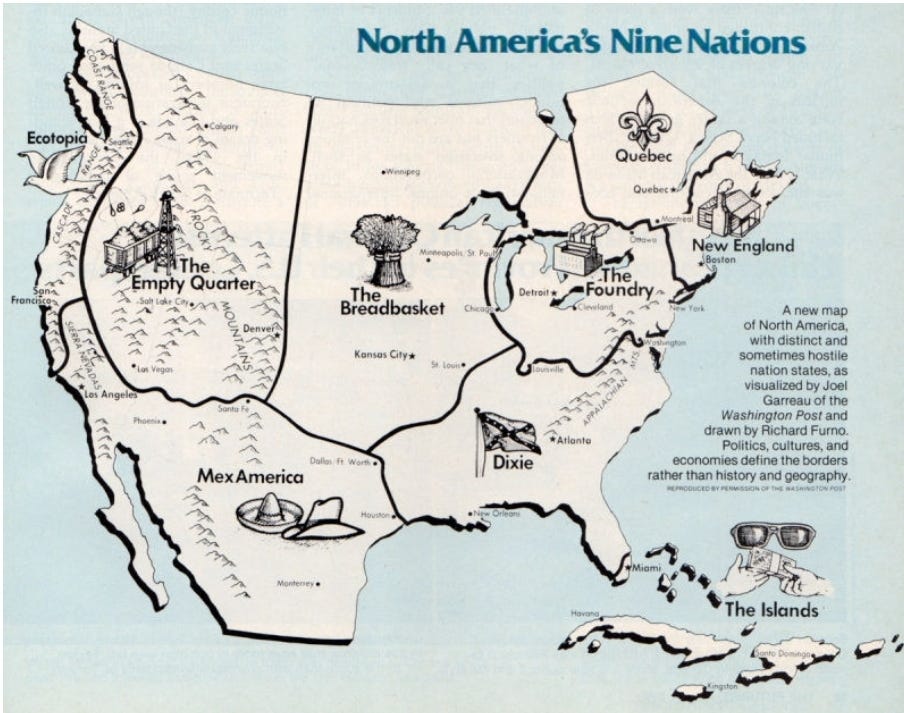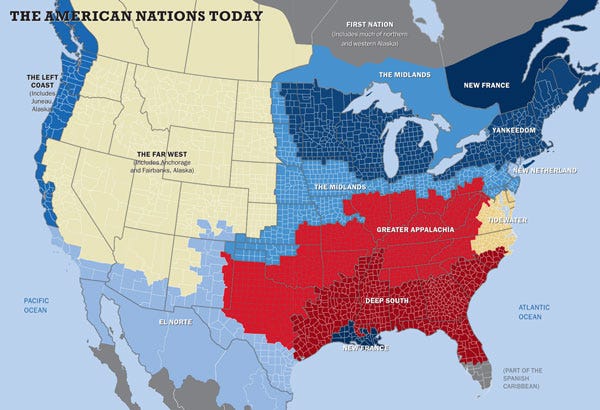Nations By Consent - Part I: Reemergent Nations in 2022
A Guidepost to a Weakening Global Power Structure
In 1994, Murray Rothbard published an essay entitled Nations By Consent, which provided an analysis that followed the collapse of the former Soviet Union.
It begins:
Libertarians tend to focus on two important units of analysis: the individual and the state. And yet, one of the most dramatic and significant events of our time has been the reemergence—with a bang—in the last five years of a third and much neglected aspect of the real world, the "nation."
This not only remains true of libertarians of the universalist variety, but much of the public in general. Yet, many current events - including the recent overturning of Roe v. Wade - should prompt us to look beyond - and perhaps even reject - this standard analytical binary.
In 1981, Washington Post editor Joel Garreau wrote:
I’m going to try to explain how the continent is really working right now, not as if it were 3 nations – the U.S., Canada, and Mexico; not as if it were 50 states; not as it should work, as an academic might have it; but how it is really working and how best to understand how we will be moving into the 21st century as a result.
Garreau expounded upon this idea in his book, The Nine Nations of North America.
American Nations author Colin Woodard takes it even further, identifying 11 distinct “nations” within the United States alone. From the communal politics of Yankeedom to the traditionally rugged individualism of the Deep South, Woodard explains in detail the diversity and tensions from their root to the present.
As the Soviet Union collapsed, Rothbard witnessed “a corollary of the collapse of communism in the Soviet Union and in Eastern Europe, a vivid and startlingly swift decomposition of the centralized State or alleged nation-State into its constituent nationalities.”
In other words, the Evil Empire consisted of an artificial consolidation that demanded brute force to remain entwined. Even so, these nationalities retained distinct undercurrents, and formally recovered their own ways of life. “The genuine nation, or nationality,” Rothbard continues, “has made a dramatic reappearance on the world stage.”
Moreover:
The "nation," of course, is not the same thing as the state...
The "nation" cannot be precisely defined; it is a complex and varying constellation of different forms of communities, languages, ethnic groups, or religions. Some nations or nationalities, such as the Slovenes, are both a separate ethnic group and a language; others, such as the warring groups in Bosnia, are the same ethnic group whose language is the same but who differ in the form of alphabet, and who clash fiercely on religion (the Eastern Orthodox Serbs, the Catholic Croats, and the Bosnian Muslims, who, to make matters more complicated, were originally champions of the Manichaean Bogomil heresy).
The question of nationality is made more complex by the interplay of objectively existing reality and subjective perceptions.
Beyond the United States, several developments have shaken and stirred around the world.
Great Britain's Prime Minister, Boris Johnson stepped down following a series of scandals and a loss in public confidence. Long-time Japanese Prime Minister Shinzo Abe was assassinated, leaving the course of Indo-Pacific affairs less certain. Protesters in Sri Lanka booted their President out of the country, who resigned by email and fled to Singapore.
The Dutch Parliament enacted radical nitrogen emissions reductions against its farmers, resulting in a massive backlash and protest. As the term “agflation” was coined, other EU member-states are similarly bound to feel the heat.
Thousands of angry Dutch farmers have used their tractors to blockade ports, airports and roads. Straw bales have been torched in streets and manure has been dumped at government buildings…
Now, in a show of solidarity, German, Italian, Spanish and Polish farmers have launched protests, in what is fast becoming an EU-wide campaign against “anti-farming” policies.
None of these events amount to much “consent” by the governed.

It was nearly 30 years ago that Rothbard called upon his most sympathetic allies to heed the paradigm shift of reemergent nations.
Libertarians and classical liberals, who are particularly well-equipped to rethink the entire muddled area of the nation-state and foreign affairs, have been too wrapped up in the Cold War against communism and the Soviet Union to engage in fundamental thinking on these issues. Now that the Soviet Union has collapsed and the Cold War is over, perhaps classical liberals will feel free to think anew about these critically important problems.
With a Great Reset imposed upon the world economy, weak leadership at home and abroad, and an increasingly unpopular war in Ukraine waged largely upon dubious justifications, it's time to consider the value of nations defined by emergent phenomena, however complex its factors may be in defining them.
External Resources:
Nations By Consent by Murray Rothbard





